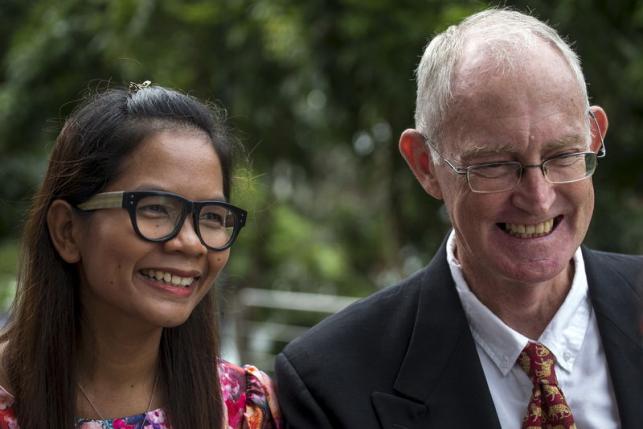Reporters cleared in Thai navy defamation case
PHUKET, THAILAND: A court on the Thai island of Phuket cleared two journalists on Tuesday of defaming the Thai navy and other related charges in a report they published in 2013 on the trafficking of Muslim minority Rohingya people from Myanmar.
The high-profile case was one of a number brought by authorities under Thailand's harsh defamation and cyber-crime laws that have drawn criticism from rights groups concerned about curbs on freedom of speech in the military-run country.
The complaint against Australian Alan Morison and Thai national Chutima Sidasathian was filed by a naval officer based in Phuket.
The two journalists faced up to two years in prison on the defamation charges and five years for offences under Thailand's Computer Crimes Act.
The judge at the criminal court in Phuket ruled the two not guilty on all counts in a verdict that took less than 15 minutes to read.
"I feel fantastic, the bad dream has ended," Morison said.
"We're just so pleased that it's over. It's good news for Thailand and for media freedom as well. Our fight was for a good cause and justice has prevailed."
Morison and Chutima smiled, embraced and shook hands with people in the packed courtroom after the judge acquitted them on the grounds their report did not constitute defamation or threaten national security.
"The news we covered was of public interest," said Chutima. "There was no need for us to self-censor."
The journalists are based in Phuket, a holiday island off southern Thailand's Indian Ocean coast, and published the report for the Phuketwan news website.
'VALUABLE WORK'
The Phuketwan report contained excerpts from a Reuters Special Report that detailed how some Thai naval security forces worked with people smugglers to profit from the exodus.
In reading the verdict, Judge Chaipawat Chaya-anandpat said the navy's defamation complaint was not relevant to the section of the Computer Crimes Act it was filed under and the original story was accurate.
"The news presented by Reuters news agency does not appear to be false or constitute to causing panic or affecting national security," he said.
The Thai navy would review the verdict in detail before deciding whether to appeal, Rear Admiral Prapatn Sombooncharoen said on Tuesday. It has 30 days to file an appeal.
The officer who filed the complaint against Phuketwan for the July 2013 story also filed a criminal complaint against Reuters reporters Jason Szep and Stuart Grudgings, alleging violations of the Computer Crimes Act.
Reuters had not been charged, company spokesman David Crundwell said on Tuesday.
"We are pleased at the court's verdict in the case today as Reuters wholeheartedly supports the principles of a free press, and the imperative of journalists across the world to publish independent and reliable news," Crundwell said in an emailed response to questions.
"Reuters strongly objects to the use of criminal laws anywhere in the world to attempt to punish journalists for the important and valuable work that they do."
Szep and another Reuters journalist, Andrew R.C. Marshall, won a Pulitzer prize in 2014 for a year-long series of stories on the Rohingya written from Myanmar, Thailand and
Malaysia.
Thailand this year cracked down on the people smugglers and traffickers who preyed on the Rohingya as they fled poverty and persecution in Myanmar through neighboring Thailand.
Thai authorities have indicted 72 people, including 15 state officials, over suspected links to trafficking in what police said was their biggest investigation of people smuggling.
Most of the estimated 1.1 million Rohingya in Myanmar live in the western Rakhine State. Tens of thousands have fled the region by boat since 2012, after violent clashes with ethnic Rakhine Buddhists killed hundreds of people and displaced 140,000.






